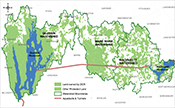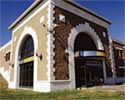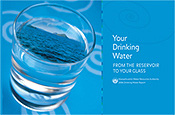PRESS RELEASE - For Immediate Release
(617) 788-1105, <ria.convery@mwra.state.ma.us>
MORE INFORMATION |
WATERSHED PROTECTION |
WATER TREATMENT |
WATER TESTING |
You may have read recent press reports on the potential presence of trace amounts pharmaceutical chemicals in water supplies around the country.
MWRA Water Comes From Well Protected Sources
Almost all other water systems take their supply from rivers and lakes into which wastewater is discharged. The principal source of many of the trace amounts of pharmaceutical chemicals found in those supplies is from wastewater.
MWRA's protected watersheds have NO wastewater discharges into the reservoirs or tributaries. Any area within the MWRA watershed which has dense enough development to require sewers has those sewers pumped to a treatment plant OUTSIDE the watershed.
MWRA's watersheds are so well protected that federal and state regulations only require disinfection treatment (without the addition of a filtration removal step). Most other water systems have sources which are less protected, more developed, and more polluted, and even much more extensive treatment, may find additional chemicals in their water.
MWRA owns over 150 square miles of the land around its reservoirs of its watersheds, including all the land around the reservoir and almost all of the most critical lands close to the streams feeding them. Most of the remaining land is undeveloped forest and wetlands. See maps and additional information at http://www.mwra.com/04water/html/watshed.htm and at http://www.mass.gov/dcr/waterSupply/watershed/water.htm
Another possible source that affects many other water systems is extensive livestock operations. Natural and artificial hormones and other pharmaceutical compounds can runoff from these operations into streams and get into water supplies. MWRA has purchased and eliminated almost every commercial livestock operation within its watersheds.
MWRA's Ozone Treatment Would Destroy Most Pharmaceutical Chemicals
In 2005, MWRA began treating the water at the new John J. Carroll Water Treatment Plant, using a state of the art ozonation system. In addition to providing excellent disinfection, and improved taste and clarity, ozone is a powerful oxidant. While MWRA does not expect that tests will show any pharmaceutical compounds in its source water, it is reassuring that recent research indicates that the type of ozone disinfection process currently being used by MWRA is effective at oxidizing and destroying these types of compounds.
MWRA Has Been Actively Following This Issue
MWRA water comes from the well protected Wachusett and Quabbin watersheds in central Massachusetts, and based on what the most current research indicates about the sources of these chemicals, MWRA believes there is little possibility for them to be present in our drinking water.
MWRA takes our responsibilities for the safety of our water and the confidence of our customers extremely seriously. While the Environmental Protection Agency has not set standards for any pharmaceutical compounds, nor required testing for them, MWRA has joined with other water systems, the University of Massachusetts, and the American Waterworks Association Research Foundation (AwwaRF) to test for them in our source water, and to research how well existing treatment techniques destroy them. That work funded jointly by the water systems, Massachusetts Department of Environmental Protection and the AwwaRF, is under way.
As always, once MWRA receives the data, we will make it available to the public. MWRA has extensive information about water quality on our website www.mwra.com and a water quality information line to respond to questions - 617-242-5323.
In addition, MWRA regularly tests for two potential endocrine disrupting compounds and has recently tested for another eight - plus caffeine (which is an indicator of the presence of wastewater in drinking water.) None of these 11 compounds were found in MWRA's source water.
What About the Wastewater?
While MWRA does not expect to find any of these pharmaceutical compounds in the drinking water, they are, of course, in the wastewater. Any natural or artificial chemical excreted by people or dumped into sinks and toilets ends up in wastewater.
MWRA and many other wastewater agencies have been concerned about this issue, and are working to understand the implications of their presence and to reduce them at the source. After being treated at the Deer Island wastewater treatment plant, MWRA's treated wastewater is discharged 9.5 miles into deep water in Massachusetts Bay, far from any water supplies.
You can help by properly
disposing of any excess drugs. While there are currently no programs in
the metro Boston area that allow you to return excess drugs to the pharmacy,
you can still help out. Don't flush them down your toilet, double bag
them in plastic and put them in the trash.
###
Updated April 28, 2008


